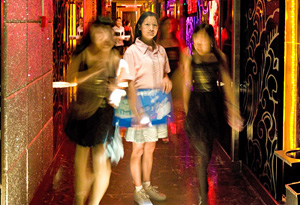On the Front Lines of Global Women's Health

Photo: Courtesy of PSI.org
They live in different parts of the world, but these five women share a common passion to improve the health of women in their communities. Read how international women's health organization PSI is helping them do just that.
Yingzi—A Young Woman on a MissionYingzi left home at 13 with a hope of making money for her farming family in rural Jinping County, Yunnan Province, China. Her friends told her she should go to a big city to find work. So when she had the opportunity to leave Jinping, Yingzi made her move. She went to Mengzi City.
When she first arrived, Yingzi took various jobs in restaurants and clothing shops and as a nanny. But with a salary of 400 or 500 yuan a month, she couldn't afford to eat well and still support her family. When she was 16, she decided to get a job at a karaoke bar, or a KTV, as they're commonly known. Karaoke bars in China are at the heart of the country's sex industry. Customers are usually groups of men who want to sing and drink in the company of young women.
"Looking back, I think the friends that told me to come to Mengzi were sex workers, but when I first arrived, I didn't know what they were doing," Yingzi says. "In the beginning, I didn't do sex work. But later, for economic reasons and because my family was poor, I started to."
It wasn't long before Yingzi realized the risks associated with living life as a sex worker. She saw many girls, some as young as 15 years old, with reproductive health problems, including severe abdominal pain. Like Yingzi, they had no family members around who could take them to the hospital for treatment. "Knowing these women's health conditions made me realize how hard life can be."
In 2009, Yingzi got acquainted with PSI through the Mengzi Sisterhood Health Home (SHH), a drop-in center for female sex workers that was launched in August 2005 as a focal site for PSI's outreach program. In December 2009, Yingzi became a part-time staff member at PSI/China.
Yingzi does outreach work in brothels and KTVs. She also works at SHH as a peer educator. The program, funded by the U.S. Agency for International Development, reaches female sex workers, a particularly vulnerable population in Mengzi, through quality outreach and interpersonal communication methods. HIV prevention activities are peer-based using carefully tailored behavior change messages that are evidence-based and determined through exhaustive research. SHH provides free checkups for sexually transmitted infections (STIs) by a local doctor, who can also make referrals for other testing and/or treatments at the local maternal and child health hospital.
After working in the sex industry for several years, Yingzi has come a long way. As a PSI/China peer educator, she has not only learned how to protect her own health but is also actively engaged in helping her peers do the same for themselves. "I've learned a lot from working at PSI. Now I know about women's health, reproductive health and how to protect myself. Take condoms as an example. I used to not know how condoms could protect me. But I've learned a lot here, especially as a girl from a rural village. I think PSI is a good place."



